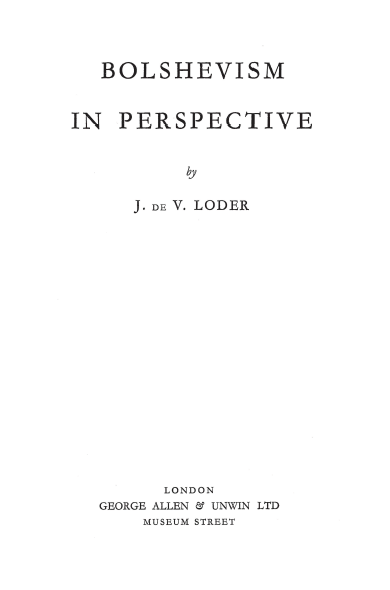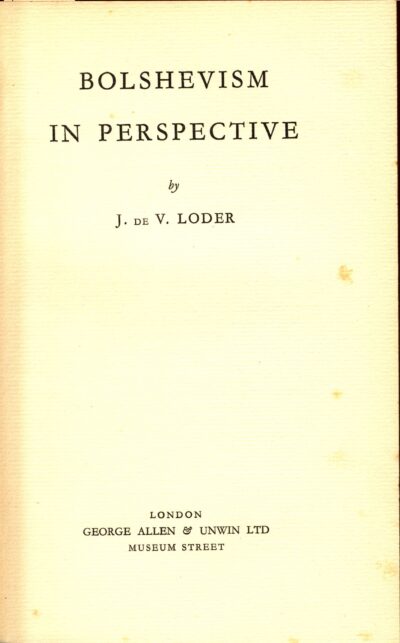J. De V. Loder, Bolshevism in Perspective (1931)
John de Vere Loder, also known as 2nd Baron Wakehurst, was a distinguished soldier, public servant, and member of the House of Commons and later the House of Lords. In 1937 he was appointed Governor of New South Wales, in part because his military service had frequently overlapped with ANZAC deployments in Gallipoli, Egypt, and Palestine. Though in the Commons he represented the Conservative Party like his father before him, his Australian Dictionary of Biography entry describes him as ‘a moderate, even left-wing Tory’ who was quite close with Labor Premier William McKell. As Governor he served a record tenure which lasted until 1946, and he was the last ‘import’ to take on that role.
Having worked with the Foreign Office and the League of Nations, Wakehurst was an enthusiastic traveller, and before becoming Governor he took two observational trips to the Soviet Union where he even met Stalin’s mother. It was these trips which informed Bolshevism in Perspective, a ‘level-headed account’ of the Bolshevik Revolution and Bolshevist Russia, covering the whole ground of the Revolution, the early history of Bolshevism, and the state of Russia in the late 1920s and early 1930s.
The book tracks the initial violent attempts to abolish private property and money, significant backtracking to make concessions to private trading under Lenin’s New Economic Policy, and finally Stalin’s first ‘Five Year Plan’ which was being instituted while Wakehurst was visiting, and which he described as amounting to ‘State Capitalism’. Under the latter, the author claimed that Russia’s wealth had been greatly increased, but only at a tremendous cost born by the Russian people.
Western publications describing the Soviet system were frequent at the time, but reviewers judged Wakehurst’s to be uniquely balanced, avoiding the extremes of those commentators who wished to laud a new socialist ‘utopia’ or blindly condemn an authoritarian dystopia. Indeed, for this reason and for its first-hand observer’s view, the book is still valued as a historical resource and is now widely available in a digitised form. Wakehurst’s own attitude was that he was fundamentally opposed to the collectivist system and the level of state control required to facilitate it, but that Russia had grown used to autocracy from Tsarist experience, workers may have been better off under the new regime simply because the old had been so bad, and that despite its considerable flaws the system suited the country for the time being:
‘My main object has been to give those to whom Bolshevism is instinctively repulsive grounds for opposition based on reason rather [than] on emotion or prejudice. If an open conflict is inevitable we must go into it with our eyes open. If a conflict may still be avoided it will be because, understanding Bolshevism, and knowing where we stand ourselves, we shall not allow the two sides to drift into a position from which there is no issue’.
It is important to note the timing of the publication, which predated Stalin’s show trials and the horrific famine of 1932-33. The Gulag system was likewise very much in its infancy compared to what it would become, and would have been carefully shielded from foreign eyes. Wakehurst’s view would no doubt have been far less accommodating had he known how rapidly things would deteriorate in the USSR.
Menzies’s copy of the book is intriguing because it was likely one of the earliest detailed accounts that he would have read about communism in practice. In these circumstances it is notable that such a Cold War warrior was introduced to the intricacies of the Soviet System via a somewhat objective account. During the 1930s we know that Menzies spent considerable time contemplating the threats that democracy faced from both the left and the right, believing that its survival was by no means guaranteed and therefore had to be carefully cultivated and won. Bolshevism in Perspective likely informed this perspective by demonstrating why the communist regime was able to maintain its iron grip over a country as sizeable as Russia. Menzies was determined that this must not happen here.
You might also like...
Sign up to our newsletter
Sign up for our monthly newsletter to hear the latest news and receive information about upcoming events.




